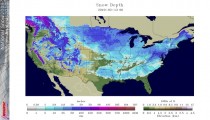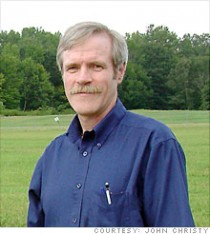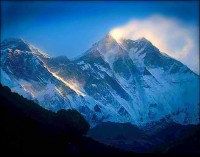By Joseph D’Aleo
Update: Guest post by Steven Goddard on Watts Up with That
A 2005 Columbia University study titled “WILL CLIMATE CHANGE AFFECT SNOW COVER OVER NORTH AMERICA?” ran nine climate models used by the IPCC, and all nine predicted that North American winter snow cover would decline significantly, starting in about 1990.

See full post here.
UPDATE: Pittsburgh now has the snowiest February on record (since 1884) with 38.5 inches and the second snowiest month ever (behind the 40.2 in January 1978. In much of Montana, snowcover has been deep and longer lasting than any year in up to a quarter century.
A significant storm has brought heavy snows to Texas through the Gulf States to the southeast coast to Charleston, SC and even the FL Panhandle. Reports are that there was some snowcover in all 50 states for the first time ever recorded (or at least since the great cold outbreak of 1898/99). In actual fact, Hawaii, which normally has snow on its high volcanic peaks and did a few weeks ago, doesn’t at the moment although I would guess if you searched hard enough in the crevasses on the north facing slopes you might find some but even 49 states is quite a rare feat. The Joe Romm memorial winter continues to amaze.

The amazing snowcover map for February 13, 2010 enlarged here.
NATIONAL WEATHER SERVICE FORT WORTH TX
410 AM CST FRI FEB 12 2010
...Snow Event One For The Record Books…
As of Midnight CST, DFW Airport had recorded 11.2 inches for the calendar day. This is the greatest calendar-day snowfall total on record for Dallas/Fort Worth. The previous record was 7.8 Inches on January 15, 1964 and January 14, 1917.
As of 4 AM...DFW Airport had recorded 12.5 Inches of snow in the prior 24 hours. This breaks the previous 24-Hour record for February...7.5 Inches On February 17, 1978 and February 25, 1924.
This brings the seasonal snowfall total To 15.7 Inches...which is the 2nd highest seasonal total on record for Dallas/Fort Worth behind just 1977-78. This is the snowiest winter in 32 seasons (since 1977-1978).
DALLAS/FORT WORTH - SNOWIEST SEASONS
1 17.6 1977-78
2 15.7 2009-10*
3 15.3 1963-64
4 13.5 1923-24
5 10.4 1976-77
6 9.5 1909-10
7 9.2 1916-17
8 8.8 1947-48
9 8.1 1937-38
10 7.3 1965-66 and 1941-42
As the storm moved east, 8 inches fell in parts of MS not far from Jackson, 7 inches fell at Cooks Crossroads in AL, 4 inches of snow fell in Atlanta, GA with up to 6 to the southeast, 4 inches fell at Athens, GA and even 2 in Macon, GA and 3 inches fell in Charleston, SC with up to 7 inland. 1 inch fell at Jay in the northwest FL Panhandle. In all, 1180 snow records were set.
See Snow Line is Moving SOuth by Steve Goddard on Watts Up With That here.
-----------------------
Watch here as Bill Nye the Science Guy says that these storms are consistent with global warming and its just us older folks that can’t grasp the idea that billions more people are inducing climate change while younger people (brainwashed by their schools) seem to grasp it better.
See “A Psychological Profiling of Global Warming” in Clamour of the Times where Philip Stott explain why some people can’t let go of global warming here.
-------------------------
Climate panel facing calls to restructure
By Eloise Gibson, NZ Herald
Breaking News: Scroll down to ICING THE HYPE to see how one member of the CRU investigative panel has resigned
Leading climate scientists from three countries have called for radical changes to the United Nations’ climate change panel as it faces intense scrutiny.
NZ experts say the Intergovernmental Panel on Climate Change (IPCC) should simply follow its own rules to avoid slips such as the 2007 error exaggerating the speed of glacier melt in the Himalayas.
But four of five climatologists who were asked to propose solutions in the international journal Nature suggested more radical options. The Nature article, released yesterday, asked: “IPCC: cherish it, tweak it or scrap it?”.
Mike Hulme, an IPCC lead author of the University of East Anglia in England, said the panel should be split after its 2014 report to part the physical scientists who observe and predict climate change from a separate policy analysis group. A third group would carry out regional assessments.
He wanted six-yearly assessments covering all aspects of climate change scrapped in favour of policy reports on options such as carbon border tariffs and ways to slow deforestation.
A separate group of physical scientists would write “smaller, sharply focused” updates on the science. Jeff Price, a lead author on the third and fourth IPCC reports, said the process was too slow: “A new class of short, rapidly prepared, peer-reviewed reports is needed.”
And Eduardo Zorita of the GKSS Research Centre in Germany said the IPCC should be replaced by an “International Climate Agency”, perhaps with 200 staff. He said the International Atomic Energy Agency, the European Central Bank or the US Congressional Budget Office showed it was possible to be independent and respected.
John Christy of the University of Alabama suggested turning the IPCC into “a living, Wikipedia-IPCC” open to published scientists, to be updated online and with sections overseen by groups of four to eight experts.

Several experts said a problem was that the IPCC produces its main reports only once every six years. The last was in 2007 drawing on the work of 2500 experts and totalling about 3000 pages.
But Thomas Stocker of the University of Bern, a co-chair of one of the IPCC's three main working groups, defended the panel's existing plans, saying reports every six years ensured "the robustness required for a thorough assessment".
He said the panel had fulfilled its role as an "honest broker" with "remarkable rigour and integrity".
New Zealand climate scientists agreed, saying that rather than "fixing" the panel its facilitators should be asking why the Himalayan glacier paper made its way into a report and how it was not picked up.
"It is ... clear that this mistake could have been avoided," said Victoria University climate researcher Andy Reisinger, "if all people involved in the process ... had meticulously followed the existing guidelines.
"Asking for wholesale revision to the IPCC in the wake of this mistake appears to be throwing out the baby with the bathwater, and dismantling the bath tub as well, when all it needed was a reminder to clean behind the ears."
An error that Himalayan glaciers could melt by 2035 - a huge exaggeration of the thaw - led to calls for reforms of the panel that shared the 2007 Nobel Peace Prize.

Read more here.
UPDATE: See Kirk Myers Seminole County Exnvironmental News Examiner column here on snowstorms and global warming.




